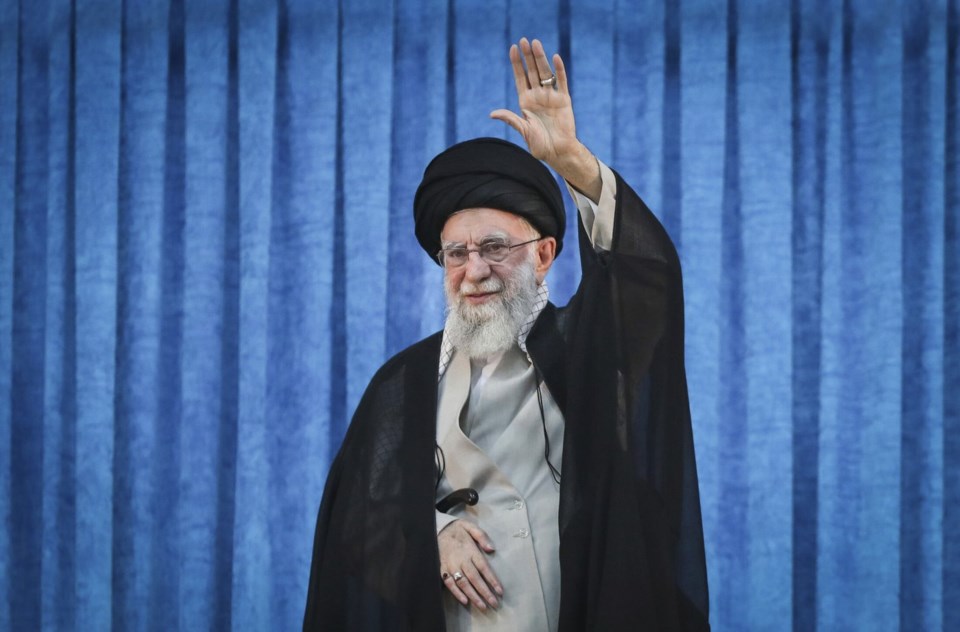DUBAI, United Arab Emirates (AP) — Iran's supreme leader on Wednesday criticized an initial proposal from the United States in negotiations over Tehran's rapidly advancing nuclear program, though he stopped short of entirely rejecting the idea of agreement with Washington.
The remarks by Ayatollah Ali Khamenei colored in the red line expressed over recent days — one that says Tehran refuses to give up enriching uranium in any possible deal with the U.S.
That demand has been repeatedly made by American officials, including President Donald Trump, though it remains unclear just how much U.S Mideast envoy Steve Witkoff brought it up in his initial proposal to Iran.
But what Khamenei did not say in his speech matters as well. He didn't reject the talks, which Iran views as crucial for its economy to lift some the crushing economic sanctions it faces.
Khamenei also did not insist on any specific level of nuclear enrichment. Iran now enriches uranium up to 60% — a short, technical step from weapons-grade levels.
Iran's Foreign Minister Abbas Araghchi, who has led the talks with Witkoff, said Tehran soon will offer its response to the U.S. Khamenei's speech Wednesday at the mausoleum of Grand Ayatollah Ruhollah Khomeini may serve as a preview.
“If we had 100 nuclear power plants while not having enrichment, they are not usable for us,” Khamenei said. “If we do not have enrichment, then we should extend our hand (begging) to the U.S.”
Khamenei touched on previous remarks
The 86-year-old Khamenei, who has final say on all matters of state in Iran, often balances his remarks over the demands of reformists within the country who want the talks against hard-line elements within Iran’s theocracy, including the paramilitary Revolutionary Guard.
Late in August, Khamenei in a speech opened the door to possible talks with the U.S., saying there is “no harm” in engaging with the “enemy.” The supreme leader later tempered that, saying that negotiations with America “are not intelligent, wise or honorable,” after Trump floated nuclear talks with Tehran.
Khamenei's speech on Wednesday, marking the anniversary of Khomeini's death, offered an opportunity to discuss Witkoff's proposal. He described it as “100% against the idea of ‘we can,’” borrowing from an Iranian government slogan. He described the U.S. as having long sought the dismantling of Iran’s entire nuclear industry.
“The impolite and insolent American leaders keep repeating this demand with different wordings," Khamenei said.
He added, using a slogan he's said before: “Those currently in power, Zionist or American, should be aware that they can’t do a damn thing about this."
Some nuclear power nations do get uranium from outside suppliers, however. Experts long have viewed Iran as using its nuclear program as a chip in negotiations with the West to get sanctions relief.
Details of American proposal are still murky
The details of the American proposal remain unclear after five rounds of talks between Iran and the U.S.
A report by the news website Axios on the American proposal, the details of which a U.S. official separately confirmed, include a possible nuclear consortium that would enrich uranium for Iran and surrounding nations. Whether Iran would have to entirely give up its enrichment program remains unclear, as Axios reported that Iran would be able to enrich uranium up to 3% purity for some time.
A failure to get a deal could see tensions further spike in a Middle East already on edge over the Israel-Hamas war in the Gaza Strip.
Iran's long-ailing economy could enter a free fall that could worsen the simmering unrest at home. Israel or the U.S. might carry out long-threatened airstrikes targeting Iranian nuclear facilities. And Tehran may decide to fully end its cooperation with the United Nations’ nuclear watchdog and rush toward a bomb.
___
Associated Press writer Nasser Karimi in Tehran, Iran, contributed to this report.
Jon Gambrell, The Associated Press




